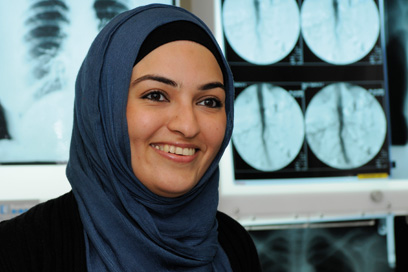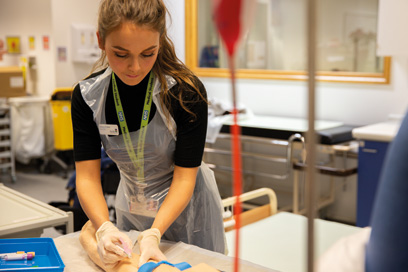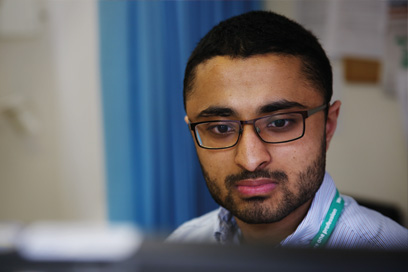Medicine MBChB
Course type: Single Honours
Duration of study: 5 years
UCAS code: A100
Thank you for your interest in our medicine degree programme that focuses on graduating excellent clinicians. As the vital roles of healthcare professionals are in the public eye like never before, you have probably been brought to this web page by your desire to make a difference to people’s lives through the skills and knowledge acquired by studying medicine.
The Covid-19 pandemic has presented an unprecedented challenge to healthcare provision in the UK. Our medical students have been outstanding in contributing to healthcare, particularly locally in Staffordshire and Shropshire. Over 150 students from Years 1–4 have volunteered for a variety of activities to support the public. Students in the early years have taken part in local schemes to support people isolated by the outbreak, help with childcare, and deliver medicines or shopping. Students in Year 4 have taken up medical assistant positions within our local hospital trusts. In these positions, under appropriate supervision, they have helped in frontline healthcare, performing tasks such as taking blood and setting up drips.
We are particularly proud of our final-year students. As a university, we were able to accelerate their graduation in response to a national request so that those wishing to could join the medical workforce three months earlier than usual. So far, over 80 new Keele medical graduates have taken up positions as “interim Foundation Year 1 doctors”, mainly in acute trusts in Staffordshire and Shropshire. A further 21 have chosen to take medical assistant roles locally. We have set no expectations that our students and graduates should take up these positions. For some students this would not be possible for personal reasons. However, the decision of so many students to contribute reflects their own sense of social responsibility which typifies our ethos at Keele University School of Medicine.
Throughout the MBChB course there is an emphasis on feedback to help you improve your knowledge, understanding and performance of medical practice. The modern, spiral, highly-integrated medical curriculum combines a range of learning strategies, including:
- early clinical experience
- integrated communication and clinical skills teaching
- practical sessions, including dissection
- problem-based-learning (PBL), lectures, and seminars.
You will have extensive experience of clinical placements in both primary and secondary care settings and in the community sector. Inter-professional learning and student interests are fostered throughout the programme.
Further opportunities for diversity are encouraged through intercalation. Opportunities for intercalation to pursue an additional qualification in a medicine-related subject are available, and include studying at bachelor’s level after the second year or master’s level after the fourth year. Intercalation is a year out of your undergraduate medical studies in order to study a subject area in greater depth before returning to complete the medical course. An intercalated degree provides you with:
- an opportunity to pursue an additional qualification in a medicine-related subject that interests you
- acquire a better understanding of basic biomedical sciences, medical humanities and research methodologies
- publish scientific papers and present at conferences.
School of Medicine
Overview and student interviews produced in October 2011. The movie is still relevant, but some details may have changed. Our student intake has increased to approximately 170 per year.
Year 3 to 5 of the curriculum produced in August 2013. The movie is still relevant, but some details may have changed.
School of Medicine
David Weatherall building
University Road
Keele University
Staffordshire
ST5 5BG
Tel: +44 (0) 1782 733937
Email: fmhs.facilities@keele.ac.uk
Admissions enquiries: enquiries@keele.ac.uk
The Clinical Education Centre
Keele University
Clinical Education Centre
University Hospitals of North Midlands NHS Trust
Newcastle Road
Stoke-on-Trent
Staffordshire
ST4 6QG
Email us: services.cecreception@keele.ac.uk
CEC general enquires: 01782 731876





